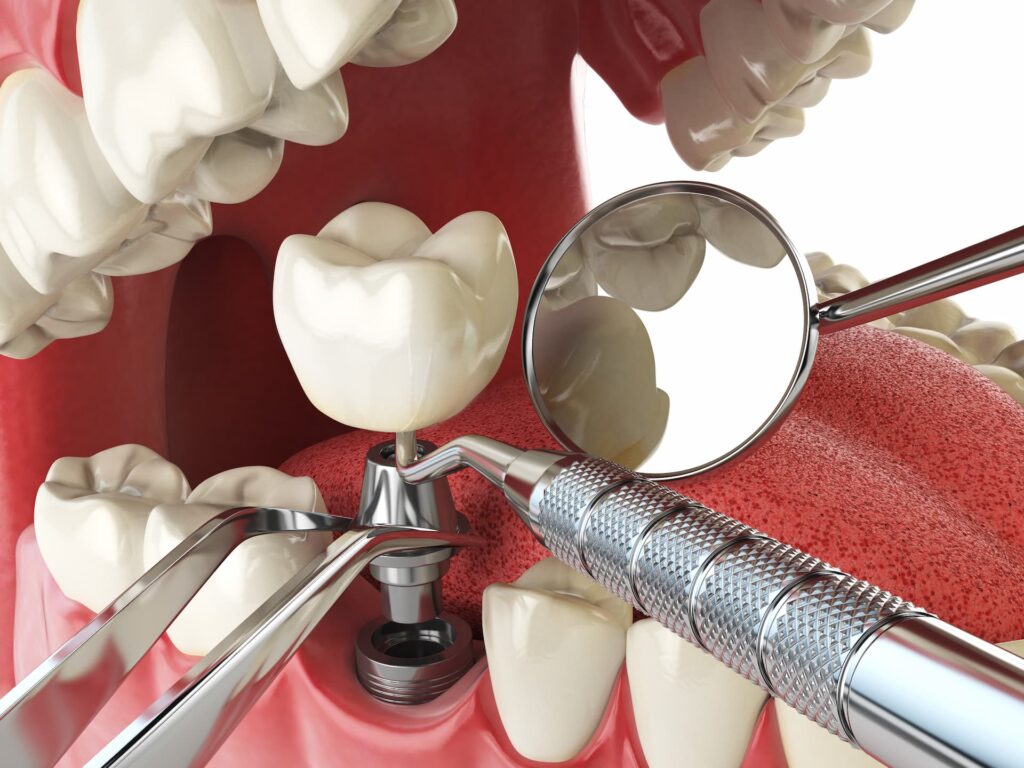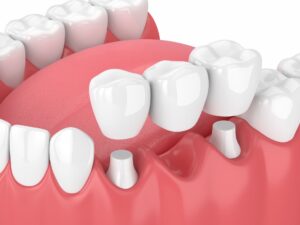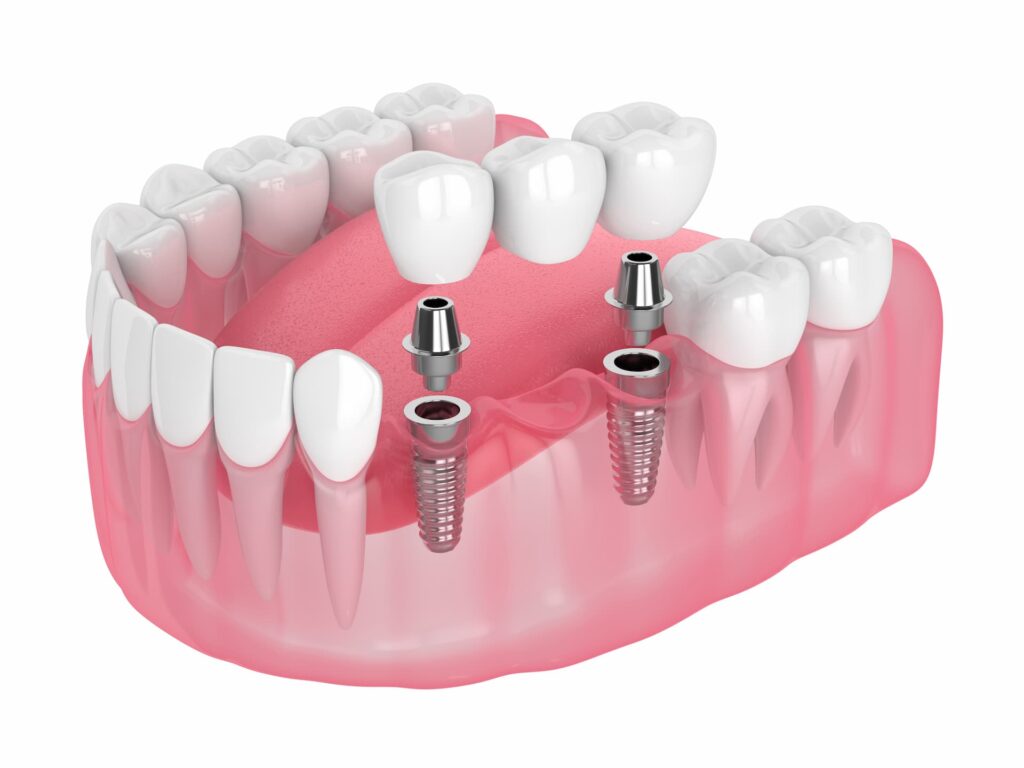Dental implants and bridges are two types of dental restorations that are used to replace missing teeth. Dental implants are a permanent solution that uses a titanium post that’s surgically placed in the jawbone, while bridges rely on the neighboring teeth for support. Both implants and bridges can provide a natural-looking and functional smile.
At Hanna Dental, we understand the importance of having a healthy and beautiful smile. A dental implant or bridge can improve your quality of life, as it helps you speak, chew and smile easily. We want to ensure that our patients can benefit from the best technology and techniques to restore their mouths to health.
Dental Implants vs. Bridges: What’s the difference?
For those looking for a replacement for a missing tooth, it’s important to know the differences between dental implants and bridges. Dental implants and bridges are both permanent solutions for replacing missing teeth, but each option has differences in structure, cost, and longevity.
What are Dental Implants?

Dental implants are titanium posts surgically placed in the jawbone, functioning as a sturdy anchor for artificial teeth. They are designed to look, feel, and function like the patient’s natural teeth. Implants are the most reliable option for replacing missing teeth, and they can last a lifetime with proper care.
What are Bridges?

Bridges are used to fill in the gap left by a missing tooth. They are usually made of porcelain or ceramic fused to metal and supported by adjacent teeth. Bridges are more cost-effective than implants, but they require more maintenance and may not last as long.
Dental Implants vs Bridges: Comparison Table
| Dental Implant | Bridge |
| May last a lifetime with proper care | Have to be replaced every 5 – 7 years |
| Requires oral surgery | Simple procedure without oral surgery |
| Higher initial cost, more economical over time | Economical at first, but has to be repeated |
| Won’t damage the healthy teeth around the implant | More cavities and tooth decay in surrounding teeth than with implants and can damage the healthy teeth around the missing tooth |
| A full dental implants procedure can take months | Dental bridges can be installed in two trips to your dentist spread over a couple of weeks. |
| Titanium posts implanted with ceramic or porcelain bridges placed on top | Porcelain or ceramic |
How do Dental Implants work?
Dental implants are small titanium posts that are surgically placed into the jawbone, providing a secure and permanent foundation for replacement teeth.
The implant itself is made up of three parts:
- the implant body
- the abutment
- the crown
The implant body is placed into the bone and acts as the “root” of the replacement tooth. The abutment is a connector that attaches to the implant body and allows the crown to be secured. The crown is the visible part of the tooth and is custom-made to match the natural teeth.
Here’s the Step by Step Procedure:
- The dental implant procedure begins with a consultation to determine if a patient is a suitable candidate for the procedure.
- During the procedure, the implant is placed into the jawbone and left to heal for several months.
- Once healed, the abutment is placed, and the crown is attached.
The entire process typically takes a few months to complete.
What are the Benefits of Dental Implants?
Dental implants have many benefits. They provide a secure and permanent foundation for replacement teeth, making it a great option for those who are missing one or more teeth.
Implants are also more comfortable and natural-looking than other tooth replacement options, such as dentures and bridges.
Additionally, dental implants can help preserve the jawbone and prevent further loss of bone density when a tooth is lost.
Costs and insurance coverage of Dental Implants
The cost of dental implants varies depending on the type of implant, the number of implants needed, and the complexity of the procedure.
Most insurance companies will cover at least a portion of the cost of dental implants, so it is important to check with your insurance provider to determine what costs are covered.
How do Bridges work?
A bridge is a fixed prosthetic device used to replace missing teeth. A bridge typically comprises two or more crowns for the teeth on either side of the gap, with a false tooth in between. The false tooth can either be made of porcelain, metal or a combination of both and is attached to the crowns to bridge the gap.
Step by step procedure
- The bridge procedure typically starts with a dental exam and X-rays to determine if the patient is a good candidate for a bridge.
- If it is determined that a bridge is the best option, the adjacent teeth will be prepared by removing a portion of enamel to make room for the bridge.
- Impressions will be taken of the prepared teeth to make a model for the bridge.
- A dental lab will use the model to create the bridge, which will then be fitted and bonded to the prepared teeth.
Benefits of bridges
Bridges have several advantages, including filling gaps, restoring the ability to chew and speak properly, preventing the shifting of teeth, and providing a natural-looking smile. Bridges are also a great solution for those who cannot get a dental implant due to cost or other health issues.
Costs and insurance coverage
The cost of a bridge can range significantly depending on the type of bridge and material used. Many insurance companies will cover some of the cost of a bridge. However, it is important to check with the insurance provider to get an estimate of the out-of-pocket expenses.
Dental implant vs. Bridge: Which one is right for you?

When it comes to choosing between a dental implant and a bridge, the ideal solution for you depends on your unique needs and oral health.
Your dentist at Hanna Dental will help you determine which option is best for you based on factors such as the condition of your teeth and gums, your budget, and your lifestyle.
Factors to consider
When considering dental implant vs. bridge, factors to consider include:
- the condition of your teeth and gums
- the cost of the procedure
- the time required for the procedure, and
- the expected longevity of the result
Pros and cons of each option
Dental implants offer a more permanent solution than bridges. They also require less maintenance and provide a more natural look. However, they are more expensive and take longer to complete.
Bridges, on the other hand, are more affordable and are usually completed within a few weeks. However, they are not as long-lasting as implants and require more frequent maintenance.
A personalized consultation with your dentist
At Hanna Dental, we provide personalized consultations with your dentist to help you decide which option is best for you. During the consultation, Dr. Hanna will discuss each option’s pros and cons, the procedure’s cost, and the expected results. They will also answer any questions you may have and provide you with the best advice for your unique needs.
Frequently Asked Questions
What is the success rate of dental implants and bridges?
Both dental implants and bridges are highly successful, with success rates of 95-98% when placed correctly. However, implants are typically more successful in the long run than bridges due to their strong, durable construction.
How long do dental implants and bridges last?
Dental implants can last up to 20 years or more with proper care, while bridges typically last between 5 and 7 years, depending on the condition of the surrounding teeth and gums.
What is the recovery time for dental implants and bridges?
The recovery time for dental implants is typically shorter than for bridges. Implants can take a few weeks to heal, while bridges may take up to several months.
Will dental implants or bridges affect my ability to eat and speak?
Dental implants and bridges should not affect your ability to eat and speak as long as they are properly fitted. However, it is important to follow your dentist’s instructions for aftercare after the procedure to ensure the best possible results.
Which is better, bridge or implant?
The best option for you depends on your individual needs and circumstances. Implants are generally considered to be the more durable, reliable option, while bridges are less invasive and may be more cost-effective.
Why is a dental bridge not recommended?
A dental bridge is not recommended in certain scenarios, such as when the adjacent teeth are weak or when the surrounding gum tissue is not healthy. Additionally, bridges may not be suitable for people with low bone density or for those with certain medical conditions.
Which is less painful; the bridge or the implant?
The pain associated with a bridge or implant procedure is typically minimal. However, implants may cause more discomfort during the initial healing phase, as the implant must be integrated into the jawbone.
Are implants stronger than a bridge?
Yes, implants are generally stronger than bridges, as they are fused directly to the jawbone. This makes them more durable and long-lasting than bridges, which rely on adjacent teeth for support.
Conclusion
Dental implants and bridges are two great solutions for replacing missing teeth. Dental implants are placed directly into your jawbone and integrate with your bone, while bridges are made up of two or more crowns that are supported by the teeth on either side of the gap.
Both options look and feel natural. However, dental implants are more secure and tend to last longer.
It is important to visit your dentist regularly to ensure your oral health is maintained. If you’re missing a tooth,it is best to seek advice from a qualified dental professional to determine which option is best for you.
Both dental implants and bridges are good solutions for replacing missing teeth. Dental implants provide a more secure, longer-lasting solution, but bridges may be more appropriate for some patients. It is important to discuss your options with a qualified dentist to determine the best solution for you.
Need Help in Making a Decision?
Are you trying to decide between a dental implant or a bridge? Here at Hanna Dental, we can help you make the best decision for your oral health.
Dental implants are a great way to replace a missing tooth and can last for many years with proper care. A bridge is also a great option for replacing a missing tooth, but it does require the neighboring teeth to be prepared for the bridge.
Both dental implants and bridges can give you a beautiful and natural-looking smile. We can help you decide which option is best for you.
We understand that when it comes to your oral health, you want to make the best decision.
That’s why we take the time to go through all the options with you and explain the benefits of each. At Hanna Dental, we use the latest technology and materials to ensure you get the best result. Schedule your consultation today.



